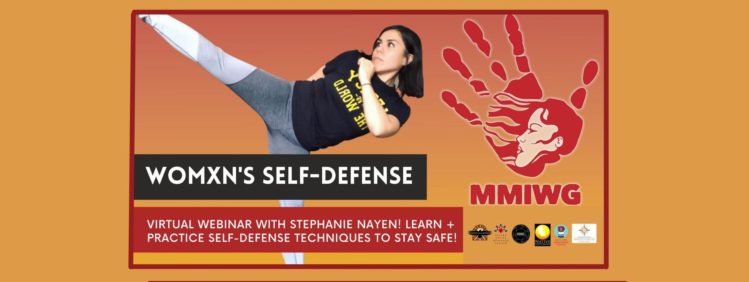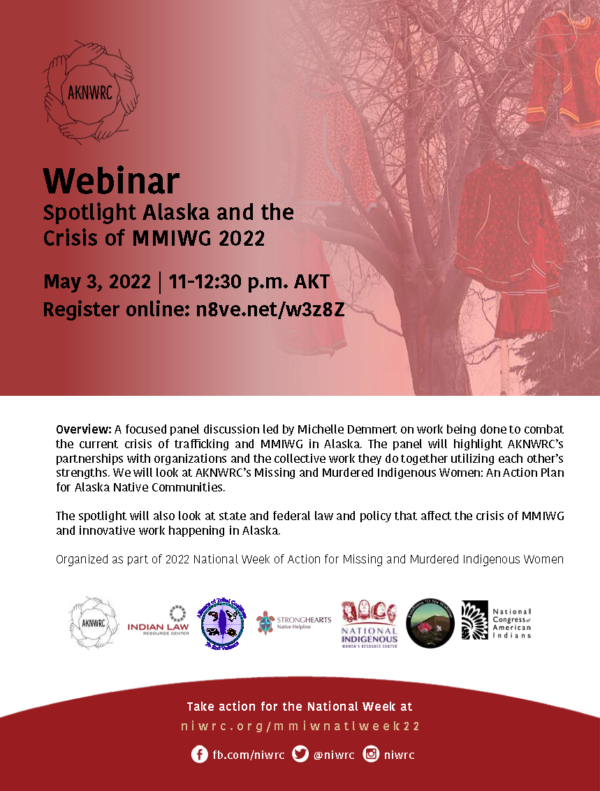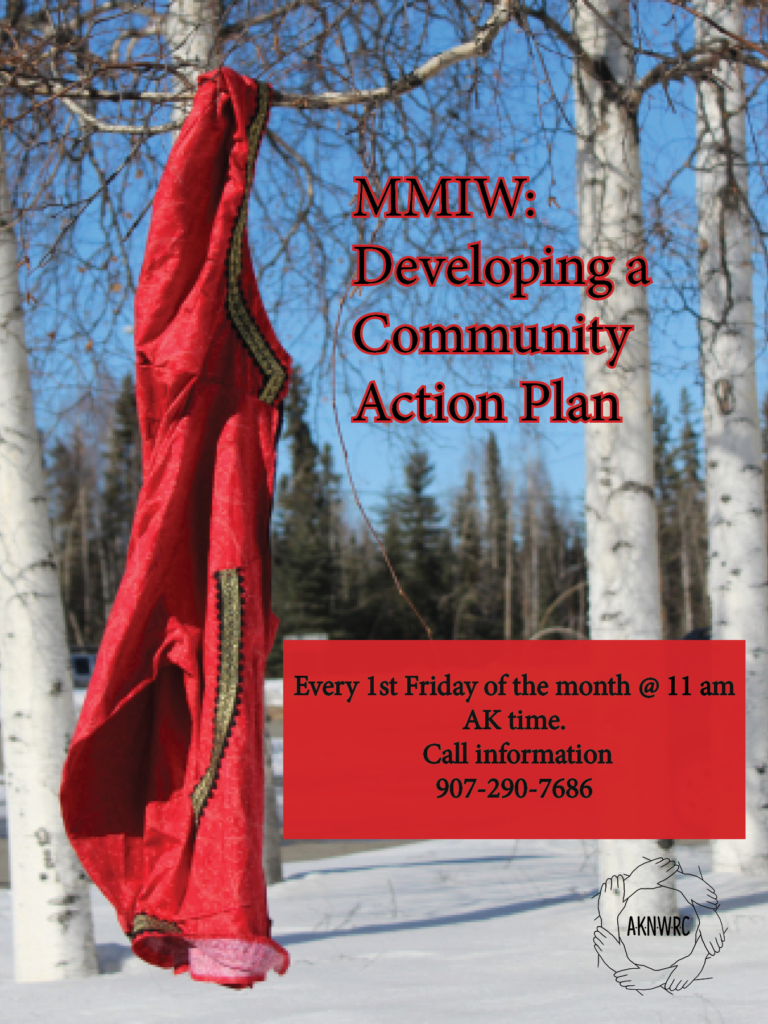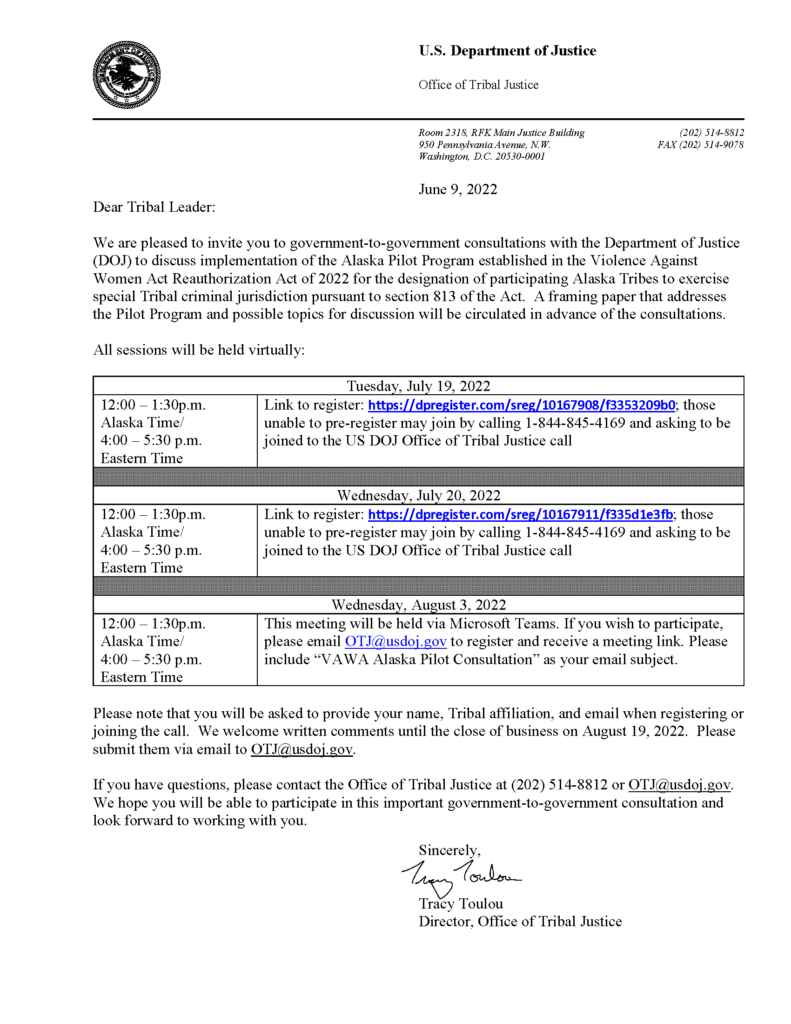EVENTS
To register go to n8ve.net/w3z8Z
And be sure to check out the other events happening during the National week of Action for MMIW starting April 29th through May 5th.
| This webinar will focus on basic best practices for advocates and domestic violence programs working with Tribal law enforcement in Indian Country. Building knowledge and networking within these systems is essential to increasing the safety of Native women and their children and other relatives experiencing intimate partner violence. | |
|

The Government to Government Consultation: OVW Tribal Jurisdiction Reimbursement Program!
The consultation will be conducted virtually July 27–28, 2022 from 9:00a.m.-1p.m. AKST
Framing Paper
Implementation of VAWA 2022’s Tribal Jurisdiction Reimbursement Program
All attendees must register to participate in the event. If you have already registered, please disregard.
For the agenda and additional details visit www.ovwtjreimbursement.org.
ABOUT
To solicit recommendations from Tribal leaders for a new OVW Tribal Jurisdiction Reimbursement Program, the Office on Violence Against Women will host a Government-to-Government Consultation: OVW Tribal Jurisdiction Reimbursement Program to be conducted virtually July 27–28, 2022. VAWA 2022 requires that the Attorney General issue regulations by March 15, 2023, establishing rules for reimbursements of Tribal governments for expenses incurred in exercising special Tribal criminal jurisdiction. To meet this deadline, OVW has determined that a special Tribal consultation dedicated to this subject is necessary.
The public is invited to attend. However, only tribally elected and appointed leaders or their authorized designees are authorized to provide testimony. The Chickasaw Speaker Management team is available to assist tribal leaders with testimony preparation, to include support in prerecording testimony.
The Violence Against Women Reauthorization Act of 2013 (VAWA 2013) recognized the inherent authority of participating Tribes to exercise “special domestic violence criminal jurisdiction” (SDVCJ) over certain defendants, regardless of their Indian or non-Indian status, who commit crimes of domestic violence or dating violence or violate certain protection orders in Indian country. The Violence Against Women Act Reauthorization Act of 2022 (VAWA 2022) amended this statute, effective October 1, 2022, to cover additional crimes, among other changes to the jurisdiction, and renamed it “special Tribal criminal jurisdiction.” The list of “covered crimes” is:
- assault of Tribal justice personnel;
- child violence, dating violence, domestic violence;
- obstruction of justice, sexual violence, sex trafficking, stalking; and
- violation of a protection order.
VAWA 2022 also authorized a new program to reimburse Tribal governments for expenses incurred in exercising special Tribal criminal jurisdiction. Eligible expenses for reimbursement under the statute include the following:
- investigating, making arrests relating to, making apprehensions for, or prosecuting covered crimes (including costs involving the purchasing, collecting, and processing of sexual assault forensic materials);
- detaining, providing supervision of, or providing services for persons charged with covered crimes (including costs associated with providing health care);
- providing indigent defense services for 1 or more persons charged with 1 or more covered crimes; and
- incarcerating, supervising, or providing treatment, rehabilitation, or reentry services for 1 or more persons charged with 1 or more covered crimes.

The Government to Government Consultation: OVW Tribal Jurisdiction Reimbursement Program!
The consultation will be conducted virtually July 27–28, 2022 from 9:00a.m.-1p.m. AKST
Framing Paper
Implementation of VAWA 2022’s Tribal Jurisdiction Reimbursement Program
All attendees must register to participate in the event. If you have already registered, please disregard.
For the agenda and additional details visit www.ovwtjreimbursement.org.
ABOUT
To solicit recommendations from Tribal leaders for a new OVW Tribal Jurisdiction Reimbursement Program, the Office on Violence Against Women will host a Government-to-Government Consultation: OVW Tribal Jurisdiction Reimbursement Program to be conducted virtually July 27–28, 2022. VAWA 2022 requires that the Attorney General issue regulations by March 15, 2023, establishing rules for reimbursements of Tribal governments for expenses incurred in exercising special Tribal criminal jurisdiction. To meet this deadline, OVW has determined that a special Tribal consultation dedicated to this subject is necessary.
The public is invited to attend. However, only tribally elected and appointed leaders or their authorized designees are authorized to provide testimony. The Chickasaw Speaker Management team is available to assist tribal leaders with testimony preparation, to include support in prerecording testimony.
The Violence Against Women Reauthorization Act of 2013 (VAWA 2013) recognized the inherent authority of participating Tribes to exercise “special domestic violence criminal jurisdiction” (SDVCJ) over certain defendants, regardless of their Indian or non-Indian status, who commit crimes of domestic violence or dating violence or violate certain protection orders in Indian country. The Violence Against Women Act Reauthorization Act of 2022 (VAWA 2022) amended this statute, effective October 1, 2022, to cover additional crimes, among other changes to the jurisdiction, and renamed it “special Tribal criminal jurisdiction.” The list of “covered crimes” is:
- assault of Tribal justice personnel;
- child violence, dating violence, domestic violence;
- obstruction of justice, sexual violence, sex trafficking, stalking; and
- violation of a protection order.
VAWA 2022 also authorized a new program to reimburse Tribal governments for expenses incurred in exercising special Tribal criminal jurisdiction. Eligible expenses for reimbursement under the statute include the following:
- investigating, making arrests relating to, making apprehensions for, or prosecuting covered crimes (including costs involving the purchasing, collecting, and processing of sexual assault forensic materials);
- detaining, providing supervision of, or providing services for persons charged with covered crimes (including costs associated with providing health care);
- providing indigent defense services for 1 or more persons charged with 1 or more covered crimes; and
- incarcerating, supervising, or providing treatment, rehabilitation, or reentry services for 1 or more persons charged with 1 or more covered crimes.





